Away from the distraction of its new high-profile politics, Wayanad's worries seemed very down to earth, discovers Shyam G Menon.
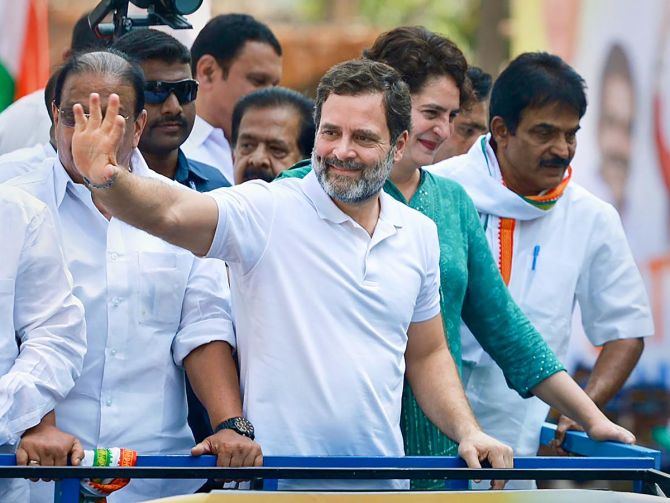
The first thing that struck me was the town's cleanliness and sense of order.
Although it was less than two weeks since Rahul Gandhi's disqualification, the few political looking-posters in town were about the upcoming conference of a pensioners association.
Maybe there was one picture I saw somewhere, of state chief minister, Pinarayi Vijayan.
Of disqualification, protest and Rahul Gandhi, there was little visible on Kalpetta's streets.
The people I spoke to felt Wayanad's former member of Parliament didn't deserve his March 23 sentencing in a defamation case and the hasty disqualification that followed. But there it ended.
Further probing brought forth a polite indifference to the whole topic making one suspect that behind it lay a disconnect between the limelight of being high-profile constituency and the daily life of the people.
Jomon hit the nail on the head.
On April 10, during a chat in his three-wheeler on the road linking Mananthavady and Thrissilery, he said that nowadays candidate matters most in local body elections.
The impact of choices made at that level are felt more immediately by the electorate than speeches in Parliament.
Wayanad is one of five districts in Kerala without a sea coast.
It is hilly; its elevation ranges from a low of 354 feet to a maximum of 7,350 feet.
Rich in foliage, a sizable portion of Wayanad is home to forests and wildlife.
There is no airport or railway station. Roads connect Wayanad to the outside world.
The mainstay of the local economy is agriculture (including plantations) and tourism.
As part of the trijunction where Kerala, Tamil Nadu and Karnataka meet, a walk through any of Wayanad's major towns will reveal more languages than Malayalam spoken.
In terms of religion, there is diversity -- Hinduism, Islam, Christianity and Jainism are found here.
While the district is composed of three municipal towns, the Wayanad Lok Sabha constituency additionally includes parts of Kozhikode and Malappuram districts.
Often called a stronghold of Kerala's Congress-led United Democratic Front (UDF), top honours in elections are typically shared between the UDF and the CPM-led Left Democratic Front (LDF). The BJP is way behind.
In the 2019 general election, Rahul Gandhi contested from Amethi and Wayanad.
"The 2019 election in Wayanad was consumed by the excitement that we may be electing somebody very important for a future government," a resident of Mananthavady working then in Kalpetta, recalled.
On election day, polling in Wayanad exceeded 80 per cent.
Rahul Gandhi lost in Amethi, but won in Wayanad by a margin of over 400,000 votes.
April 2023, the people I spoke to summarised it objectively.
"Rahul Gandhi wanted a secure seat and he found that in Wayanad," Vishal, a three-wheeler driver, told me during the ride from near the NMSM Government College in Kalpetta to the town bus stand.
According to him, the Surat court judgment and the subsequent disqualification of March 24 was a bolt from the blue.
Protests erupted in Kalpetta, the district headquarters. It persisted for a couple of days, then died out.
April 6, the day of the afore mentioned ride and conversation, was utterly normal even as Wayanad stood demoted from a constituency with a representative in Parliament to one without.
The aftertaste of demotion was one of prominence lost through exit of high profile-candidate but life going on as before.
Crucially, aside from a general notion that Rahul Gandhi had been people-friendly and had contributed to development work, nobody I spoke to could list what he did for Wayanad as its elected representative in Parliament.
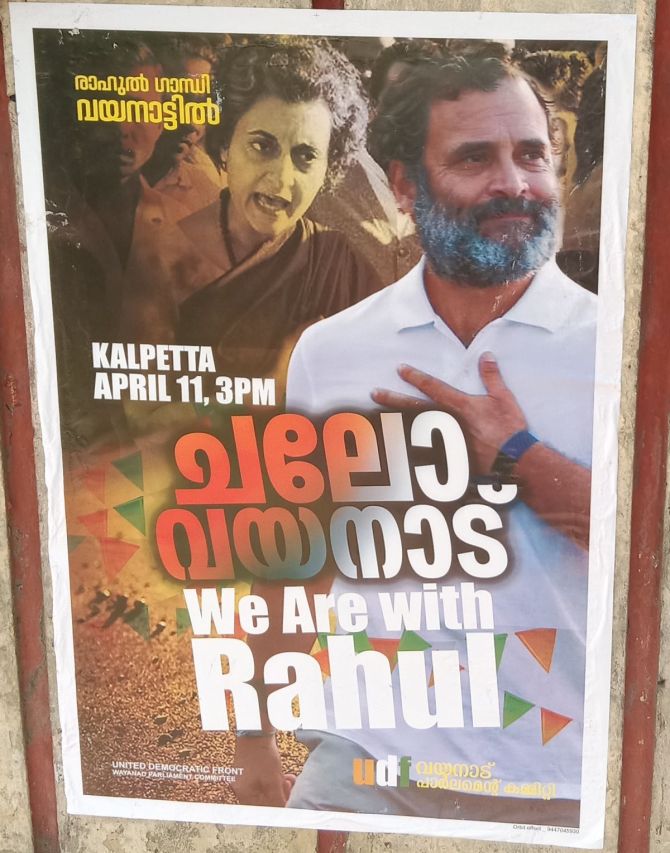
When approached, the MP's office on the outskirts of Kalpetta promptly sent over media clippings of the work he had done, most significant of which appeared to be getting funds sanctioned for improving roads.
The clippings included Rahul Gandhi inaugurating smart anganwadis, seeking moratorium on repayment of crop loans, seeking the railway minister's intervention for the proposed Nanjangud-Nilambur railway project, asking the state government to expedite measures to set up a model degree college and securing a grant of Rs 145 crore for a road development project in Wayanad.
Sadly, none of this seemed to translate into a sense of loss at his potential exit.
The office bearer of a local business association was clear that losing a high-profile MP would make no difference to Wayanad, if the yardstick used was addressing a region's needs.
After outlining Wayanad's wishes spanning railway line and airstrip to improving road network, tackling issues in agriculture and taking up tourism-related projects, he said, "what we require is a representative who understands the region's challenges and can be accessed easily."
People appreciate the fact that despite his busy schedule, Rahul Gandhi visited Wayanad whenever he found time.
Still the true measure of an elected representative is being available when the people need to connect.
Hence, the feeling in certain quarters that somebody local makes practical sense.
What should also interest is the other side of being a high-profile constituency.
According to the person from the business sphere, even as making their high-profile Congress MP adequately aware of Wayanad's problems was a challenge, the emergent status of Wayanad as Rahul Gandhi's constituency has the BJP more receptive than before to what Wayanad's trade bodies say.
"It's not what we anticipated or asked for, but that's the case," he said.
It is a tricky slope because some of the demands from business lobbies will be questioned by those concerned about the environment.
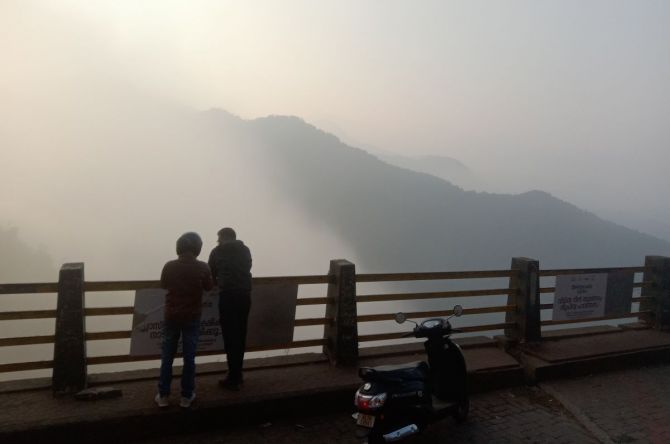
Wayanad has a history of settlers. Irrespective of whether Wayanad's representative is a local settler or outsider, a situation like the above requires regular interaction with constituency.
The people I spoke to didn't give me the impression that Rahul Gandhi succeeded at this sort of engagement.
A visitor, his new found concerns were described as "emotional" and lacking enough realism to interest his constituency tackling issues related to livelihood and infrastructure.
One senses a disconnect.
Representatives elected to state assemblies and Parliament are fundamentally law makers.
There is nothing abnormal in them being involved with issues related to democratic and Constitutional values although it may seem esoteric to those with their nose to the ground.
When they take up lofty campaigns related to democracy and Constitution, it should be the onus of MPs and MLAs to explain to their electorate the link connecting the seemingly esoteric to the local.
Thus, for instance, Rahul Gandhi's stated worry of democracy threatened under the BJP, should matter to Wayanad because if democracy is in danger, then elections themselves tread insecure ground.
Without elections, there can be no elected representative; without the freedom to speak in Parliament, elected representative won't be able to have his constituency heard.
However, even in the letter he mailed his constituency following disqualification, Rahul Gandhi has not articulated the connection between the goals he has committed himself to, and what he owes Wayanad.
"It's hard to say if it's him or those around him. But there's a disconnect with Wayanad's needs," the man from business said on April 6 despite being clear that the hastily executed disqualification of the MP, was unjust.
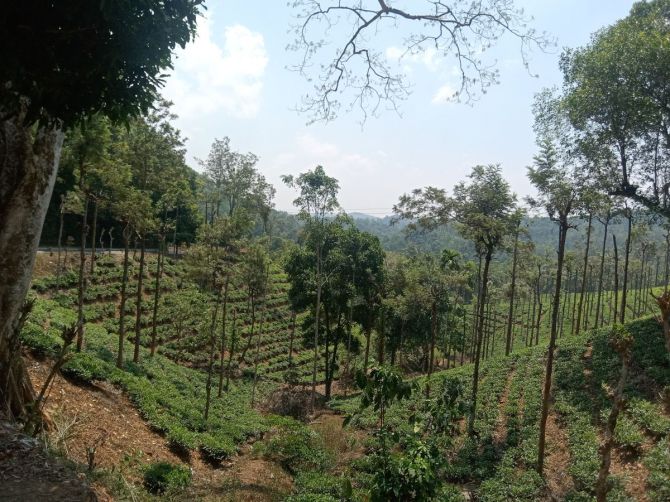
Away from the distraction of its new high-profile politics, Wayanad's worries seemed very down to earth.
Farming is huge in this hill district; some estimates have it that over 80 per cent of Wayanad's people have direct or indirect connection to agriculture.
Although plantations exist, the most visible farming style is intercropping rich in diversity.
Often farmlands and forests border each other.
On April 7, at Cheeral, around 12 kilometres from Sulthan Bathery, three farmers told me how their earnings had been affected by ever increasing input costs, high labour costs, competition with farmers from Karnataka who work under a different farming reality, growing encounters between humans and wild animals (farmers believe wildlife numbers have risen thanks to conservation efforts) and inadequate compensation by government for damage to crops caused by wild animals.
In October 2022, Cheeral had been in the news for a tiger that took to killing the villagers' cattle.
For close to a month, the animal haunted the region. Then it was trapped in a cage.
More frequent in their excursions to human settlements and farms are elephants and wild boars.
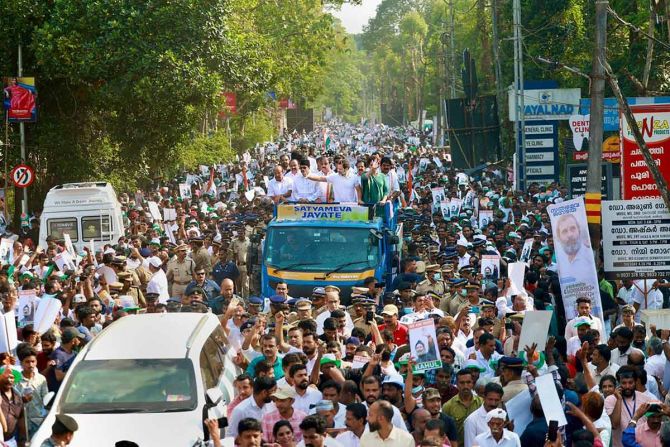
Asked what their biggest priority was currently, the farmers said that it was reducing human-animal conflict.
They maintained that they cultivate only lands meant for the purpose.
But pressures of climate change in the deep forest and the easy availability of fruits, nuts, vegetables and livestock in farms, saw wild animals venture out.
The resultant losses can be hard to bear.
With their land holdings inherited from earlier generations since subdivided, Wayanad's cultivators are mostly small or medium farmers compared to the size of holdings, economies of scale and mechanisation found in nearby states.
Labour cost has always been an issue in Kerala.
The tribal workers usually employed in Wayanad's farms have longstanding traditional skills that, some argue, aren't easily transferred.
In crops like paddy and at plantations, where a few crops are focused on, labour from eastern India has gained toehold.
But in the intercropped format that is found in many places, the local labour's knowledge of plants and relevant skills including effortlessly multi-tasking in intercropped environments, are still valued.
Availability of farm workers has also been affected by government employment generation schemes, where the work is less and money, even if less, is earned easier than at farms.
However, there were those who cautioned that given strident farmer groups existed as a backlash to recent reports highlighting the eco-sensitivity of the Western Ghats, care should be exercised in not being swayed by emotional arguments.
Scientific temper and appreciation for the environment must prevail, they advised.
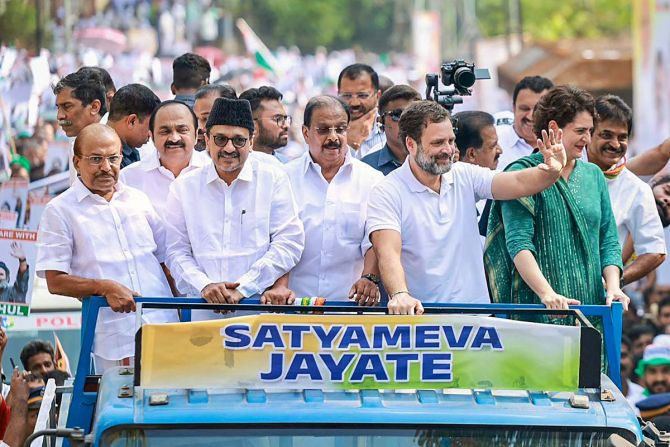
Amid this, new generations from the families of hill farmers in Wayanad, taking to agriculture, has reduced.
It is due to better education (and thereby improved opportunities), the state of agriculture and the premium attached in Malayali society to being away from home, "If you remain in Kerala, you are seen as a defective product," a person into farming that I spoke to, said in jest about the Malayali approach to life.
Critics of this view pointed out that it was merely a case of awareness of world; so, no point faulting.
On April 8, at Periya beyond Mananthavady, a rare young man from a hill farmer-family who had given up a job in the city to farm at home, outlined his reality.
"Cost of production has gone up over the years. We have to either bring down the cost of production or improve earnings through value addition," he said, adding, "short term measures by the state won't work, only sustained support will."
His property was on the periphery of a forest but one that seemed to have food within and therefore pushed wildlife less into nearby farm lands. Still, sometimes they arrived.
"That's my last line of defence," he said, pointing to a patch of sugarcane and pineapples that he grew just so, invading animals may eat those items and spare his farm's main crops.
Strangely, notwithstanding the visible thick foliage of Wayanad and the potential of its farms, nobody spoke of any initiative by authorities to create an umbrella brand around Wayanad's agricultural products and practices.
Something, that would inform Kerala's cities and towns of the merit in supporting Wayanad's produce.
So, for now, farming seemed the classical struggle to contain costs and improve revenues.
According to Rajesh Krishnan, CEO of the Tirunelly Agri Producer Company Limited, a much-studied enterprise in paddy cultivation in Wayanad, our problems in agriculture stem from the tendency of government and society to look at it as something to move away from rather than move towards.
Not to mention -- our emergent approach to economic development is obsessed with large infrastructure projects.
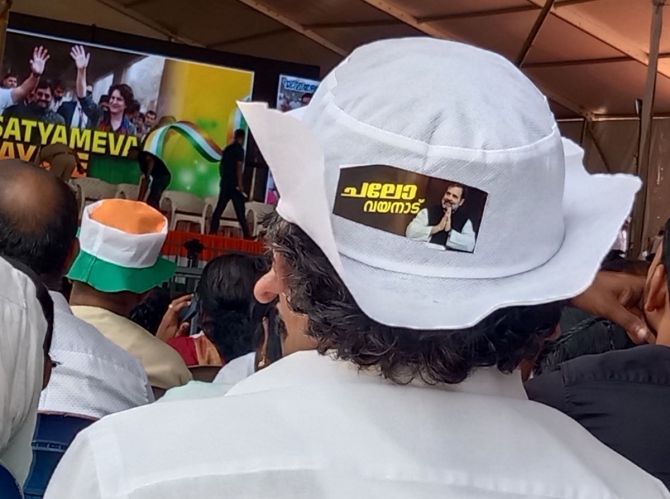
On April 10, posters of Rahul Gandhi began appearing in Kalpetta.
The next day, at a public meeting he addressed there along with his sister Priyanka, Rahul Gandhi said that he was aware of Wayanad's problems.
He also tried explaining to Wayanad how his questions and actions in parliament linked to people's lives.
A good number of Congress supporters gathered at the venue, cheered the siblings on.
Congress leaders who spoke, highlighted the good work Rahul Gandhi had done.
On the way to the meeting venue near Kalpetta's civil station, a banner thanked Rahul Gandhi for his intervention in securing a UGC NET and NEET exam centre.
Nobody I spoke to during my brief stay in Wayanad thought Rahul Gandhi will lose if he contests again, for Wayanad is a UDF stronghold.
Some felt, margin of victory may reduce because the novelty of 2019 is no longer there.
Besides as Jomon said, we aren't talking of a panchayat election.
Shyam G Menon is a Mumbai-based columnist.
Feature Presentation: Aslam Hunani/Rediff.com











 © 2025
© 2025